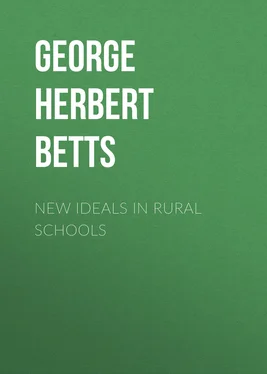George Herbert Betts - New Ideals in Rural Schools
Здесь есть возможность читать онлайн «George Herbert Betts - New Ideals in Rural Schools» — ознакомительный отрывок электронной книги совершенно бесплатно, а после прочтения отрывка купить полную версию. В некоторых случаях можно слушать аудио, скачать через торрент в формате fb2 и присутствует краткое содержание. Жанр: foreign_antique, pedagogy_book, foreign_edu, на английском языке. Описание произведения, (предисловие) а так же отзывы посетителей доступны на портале библиотеки ЛибКат.
- Название:New Ideals in Rural Schools
- Автор:
- Жанр:
- Год:неизвестен
- ISBN:нет данных
- Рейтинг книги:4 / 5. Голосов: 1
-
Избранное:Добавить в избранное
- Отзывы:
-
Ваша оценка:
- 80
- 1
- 2
- 3
- 4
- 5
New Ideals in Rural Schools: краткое содержание, описание и аннотация
Предлагаем к чтению аннотацию, описание, краткое содержание или предисловие (зависит от того, что написал сам автор книги «New Ideals in Rural Schools»). Если вы не нашли необходимую информацию о книге — напишите в комментариях, мы постараемся отыскать её.
New Ideals in Rural Schools — читать онлайн ознакомительный отрывок
Ниже представлен текст книги, разбитый по страницам. Система сохранения места последней прочитанной страницы, позволяет с удобством читать онлайн бесплатно книгу «New Ideals in Rural Schools», без необходимости каждый раз заново искать на чём Вы остановились. Поставьте закладку, и сможете в любой момент перейти на страницу, на которой закончили чтение.
Интервал:
Закладка:
This is to say that one's education must (1) furnish him with the particular knowledge required for the life that he is to live, whether it be in the shop, on the farm, or in the profession. For knowledge lies at the basis of all efficiency and success in whatever occupation. Education must (2) shape the attitude , so that the individual will confront his part of the world's work or its play in the right spirit. It must not leave him a parasite, whether from wealth or from poverty, ready to prey upon others; but must make him willing and glad to do his share. Education must (3) also give the individual training in technique , or the skill required in his different activities; not to do this is at best but to leave him a well-informed and well-intentioned bungler, falling far short of efficiency.
The great function of the school, therefore, is to supply the means by which the requisite knowledge , attitude , and skill can be developed. It is true that the child does not depend on the school alone for his knowledge, his attitude, and his skill. For the school is only one of many influences operating on his life. Much of the most vital knowledge is not taught in the school but picked up outside; a great part of the child's attitude toward life is formed through the relations of the home, the community, and the various other points of contact with society; and much of his skill in doing is developed in a thousand ways without being taught. Yet the fact remains that the school is organized and supported by society to make sure about these things, to see that the child does not lack in knowledge, attitude, or skill. They must not be left to chance; where the educative influences outside the school have not been sufficient, the school must take hold. Its part is to supplement and organize with conscious purpose what the other agencies have accomplished in the education of the child. The ultimate purpose of the school is to make certain of efficiency .
The means by which the school is to accomplish these ends are (1) the social organization of the school, or the life and activities that go on in the school from day to day; (2) the curriculum , or the subject-matter which the child is given to master; and (3) the instruction or the work of the teacher in helping the pupils to master the subject-matter of the curriculum and adjust themselves to the organization of the school.
These factors will of necessity differ, however, according to the particular type of school in question. It will therefore be necessary to inquire into the special problem of the rural school before entering into a discussion of the means by which it is to accomplish its aim.
The special problem of the rural school
Each type of school has not only its general problem which is common to all schools, but also its special problem which makes it different from every other class of schools. The special problem of any type of school grows out of the nature and needs of the community which supports the school. Thus the city school, whose pupils are to live the industrial and social life of an urban community, confronts a different problem from that of a rural school, whose pupils are to live in a farming community. Each type of school must suit its curriculum, its organization, and its instruction to the demands to be met by its pupils. The knowledge taught, the attitudes and tastes developed, and the skill acquired must be related to the life to be lived and the responsibilities to be undertaken.
The rural school must therefore be different in many respects from the town and city school. In its organization, its curriculum, and its spirit, it must be adapted to the requirements of the rural community. For, while many pupils from the rural schools ultimately follow other occupations than farming, yet the primary function of the rural school is to educate for the life of the farm. It thus becomes evident that the only way to understand the problem of the rural school is first to understand the rural community. What are its industries, the character of its people, their economic status, their standards of living, their needs, their social life?
The rural community is industrially homogeneous. There exists here no such a diversified mixture of industries as in the city. All are engaged in the same line of work. Agriculture is the sole occupation. Hence the economic interests and problems all center around this one line. The success or failure of crops, the introduction of a different method of cultivation or a new variety of grain, or the invention of an agricultural implement interests all alike. The farmer engaged in planting his corn knows that for miles around all other farmers are similarly employed; if he is cutting his hay or harvesting his grain, hundreds of other mowing machines and harvesters are at work on surrounding farms.
This fund of common interest and experience tends to social as well as industrial homogeneity. Good-fellowship, social responsiveness and neighborliness rest on a basis of common labor, common problems, and common welfare. Like-mindedness and the spirit of coöperation are after all more a matter of similar occupational interests than of nationality.
Another factor tending to make the rural community socially more homogeneous than the city community is its relatively stable population, and the fact that the stream of immigration is slow in reaching the farm. It is true that the European nations are well represented among our agricultural population; but for the most part they are not foreigners of the first generation. They have assimilated the American spirit, and become familiar with American institutions. The great flood of raw immigrants fresh from widely diverse nations stops in the large centers of population, and does not reach the farm.
The prevailing spirit of democracy is still another influence favoring homogeneity in the rural community. Much less of social stratification exists in the country than in the city. Social planes are not so clearly defined nor so rigidly maintained. Financial prosperity is more likely to take the direction of larger barns and more acres than of social ostentation and exclusiveness.
America has no servile and ignorant peasantry. The agricultural class constituting our rural population represents a high grade of natural intelligence and integrity. Great political and moral reforms find more favorable soil in the rural regions than in the cities. The demagogue and the "boss" find farmers impossible to control to their selfish ends. Vagabonds and idlers are out of place among them. They are a hard-headed, capable, and industrious class. As a rule, American farmers are well-to-do, not only earning a good living for their families, but constantly extending their holdings. Their farms are increasingly well improved, stocked, and supplied with labor-saving and efficient machinery. Their land is constantly growing in value, and at the same time yielding larger returns for the money and labor invested in it.
The standard of living is distinctly lower in farm homes than in town and city homes of the same financial status. The house is generally comfortable, but small. It is behind the times in many easily accessible modern conveniences possessed by the great majority of city dwellers. The bath, modern plumbing and heating, the refrigerator, and other kindred appliances can be had in the country home as well as the city. Their lack is a matter of standards rather than of necessity. They will be introduced into thousands of rural homes as soon as their need is realized.
The possibilities for making the rural home beautiful and attractive are unequaled in the city for any except the very rich. It is not necessary that the farmhouse shall be crowded for space; its outlook and surroundings can be arranged to give it an æsthetic quality wholly impossible in the ordinary city home. That this is true is proved by many inexpensive farmhouses that are a delight to the eye. On the other hand, it must be admitted that a large proportion of farmhouses are lacking in both architectural attractiveness and environmental effect. Not infrequently the barns and sheds are so placed as to crowd the house into the background, and the yards for stock allowed to infringe upon the domain of the garden and the lawn. All this can be easily remedied and will be when the æsthetic taste of the dwellers on the farm comes to be offended by the incongruous and ugly.
Читать дальшеИнтервал:
Закладка:
Похожие книги на «New Ideals in Rural Schools»
Представляем Вашему вниманию похожие книги на «New Ideals in Rural Schools» списком для выбора. Мы отобрали схожую по названию и смыслу литературу в надежде предоставить читателям больше вариантов отыскать новые, интересные, ещё непрочитанные произведения.
Обсуждение, отзывы о книге «New Ideals in Rural Schools» и просто собственные мнения читателей. Оставьте ваши комментарии, напишите, что Вы думаете о произведении, его смысле или главных героях. Укажите что конкретно понравилось, а что нет, и почему Вы так считаете.











